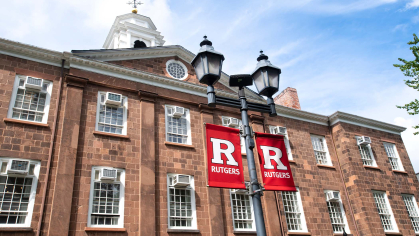Supporting Students, Recognizing Differences, Serving the Common Good: President Holloway on the State of the University

Boosting students’ success while creating a robust and engaging student experience is at the center of all Rutgers is working toward as the university moves beyond pandemic-posed challenges and changes, President Jonathan Holloway said in his address today to the University Senate.
The president reaffirmed Rutgers’ commitment to build on efforts to better serve and support students, including improving online education experiences and expanding on the early success of the new summer service internship program for undergraduates.
“If you’ve noticed a common thread among these commitments – our students – you’re right,” Holloway said. “After all, while Rutgers serves our state and the world in thousands of ways – from the cranberry farmer to the cancer patient, from the immigrant seeking asylum to the entrepreneur incubating a startup – the heart of our enterprise is and always will be the preparation of students for lives and careers of meaning.”
Rutgers, a complex and wide-ranging university, is unified by fundamental truths, beginning with a commitment to academic excellence while keeping a Rutgers degree accessible and affordable, Holloway said during his annual address to the faculty and staff senate.
Ensuring student success includes providing resources that allow students to focus on their studies rather than finances, Holloway said, noting the creation of the Scarlet Guarantee program by Rutgers-New Brunswick. Providing free tuition and mandatory fees for students in families with an adjusted gross income below $65,000 and significantly reducing tuition and fees for those in families earning up to $100,000, it builds on the successful models established first by Rutgers-Camden’s Bridging the Gap program and Rutgers-Newark’s RU-N to the Top initiative.
“Student success entails the measures we concern ourselves with every day: retention, a smooth path through the academic requirements, a timely graduation and productive careers beyond Rutgers,” Holloway said. “Student success also represents the shared space where those fundamental truths about Rutgers intersect: promoting and preserving academic excellence, supporting accessibility, aspiring to a beloved community while recognizing differences and serving the common good.”
Nearly 100 Rutgers students served the common good this year through the Rutgers Summer Service Internship initiative, which grew out of Holloway’s belief in the strong role universities can play in improving civic discourse and engagement, seeing each other’s differences and building better communities.
Funded by donors to provide stipends to students for paid internships at public service-orientated nonprofit organizations and direct-service government offices, the program will grow to 150 students next year, the president announced. And it will expand to Washington, D.C., to include a summer program placing interns in congressional offices, advocacy organizations and other public service opportunities in the nation’s capital.
Coordinating online education
Holloway also announced a council on online education to advise on universitywide policies, practices, expectations and investments to improve all aspects of the online experience for students. The council, led by Prabhas Moghe, executive vice president for academic affairs, will coordinate with members of the president’s team, including Brian Ballentine, senior vice president for strategy, and Michele Norin, senior vice president and chief information officer.
“A coordinated strategy gives us the opportunity to more effectively meet our students where they are – whether they are on campus, are seeking to complete their degrees while working full time or are engaged in lifelong learning – in new and compelling ways,” Holloway said.
While Rutgers remains primarily an in-person educational enterprise, it is important to coordinate and offer outstanding online education, Holloway said. “Online education is a means to complement and enhance what we already do in the physical classroom and laboratory.”
Student success also represents the shared space where those fundamental truths about Rutgers intersect: promoting and preserving academic excellence, supporting accessibility, aspiring to a beloved community while recognizing differences and serving the common good.
President Jonathan Holloway
The president also talked about the importance of continuing to build a culture of collaboration at Rutgers, breaking down work silos and moving away from a culture of grievance to take pride in the university as a whole.
“If you disagree with one another or with the administration, or with me, do so with fresh ideas, with integrity, with honesty,” Holloway said. “Everyone’s voice matters here, but how those voices are expressed matters, too.”
Holloway highlighted the rise in U.S. News & World Report rankings for Rutgers-New Brunswick, Rutgers-Camden and Rutgers-Newark and the thousands of Rutgers community members who contributed to extensive work over the past two years to create the university’s Diversity Strategic Plan, the Future of Work report, the Climate Action Plan and chancellors’ strategic planning efforts as examples of the university community coming together, listening to each other and envisioning a better Rutgers.
“The more we do this work, the more we become a university where there is an established reputation of listening to and working with all of our constituents,” Holloway said. “Forging this reputation is part and parcel of building the beloved community that I asked us to aspire to become when I started my presidency. I stand by that aspiration and have been excited to see so many different members of the community embrace that ethos and join in the effort to improve this great university.”
Read the full text of President Holloway's address.


